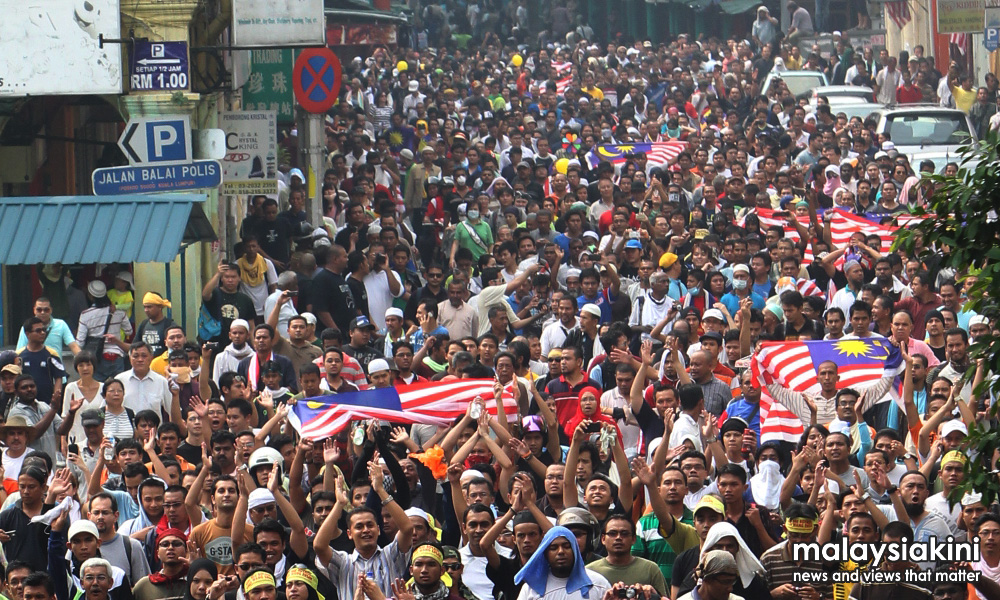
The chairperson of the Asian Strategy and Leadership Institute's Centre for Public Policy Studies, Ramon Navaratnam hit the nail on the head when he wrote in a letter to theSun recently that "Bumiputeraism is a divisive title”.
It deserves a little more elaboration. However, what Navaratnam has written is true. Having been a former top civil servant, he should know better.
As the nation is approaching 60 years of Merdeka (and 53 years of nationhood), the New Economic Policy should be gradually phased out to create a nation that is competitive. To further lift the people’s economic well-being, education is the key, not some status that is linked to one’s birth.
People develop their competitiveness not because they are born to athletes, but because they learn to develop their survival skills through the hardships they have to go through. If only some help can be given to them, they can come a long way from rags to riches.
Poverty is no longer confined to any particular ethnic group but it affects Malaysians from all walks of life. Therefore, the government of the day should be fair to all Malaysians, irrespective of race, religion or political affiliation.
When help is given, for example, through scholarships, it should be given on the basis of merit, not a person’s bumiputera or non-bumiputera status.
The bumiputera crutch
A lot of privileges are linked to the word “bumiputera”. Having grown up as a post-Merdeka baby, I will share my own observations about how such a label has already divided us.
In Navaratnam’s own words, “polarisation” is, I believe, a very apt word to describe the current economic and sociopolitical landscape.
Although I can understand that the term “bumiputera” was used in the federal constitution for a special reason, the reality is that it has been extended to mean “special privileges” that can and have been abused. Such abuses should be curtailed.
A good example is “Ali Baba” companies in this country. In order to get a project from either the government or government-linked companies, non-bumiputera companies have to appoint a bumiputera director or set up a bumiputera company which is basically a shell company to undertake such projects.
If the director is one who can contribute to the company’s business growth, that is fine, but I suspect more often than not, they are appointed to fill the gap and sit in as directors.
I can go on, but the reality is harsher than it seems.
These so-called privileges are what make some of our country’s population become too dependent on bumiputera status than being willing to work hard and prove themselves to be competitive.
In many ways, we know and I believe the Government is aware that these privileges have become a crutch for the bumiputera community at large.
Who is more bumiputera?
Then, there is also the question of who is more native to the land. Recently, Deputy Prime Minister Ahmad Zahid Hamidi took a dig at former prime minister Dr Mahathir Mohamad's Indian ancestry.
While I can understand that this can be done by ordinary citizens, such a thing coming from the government’s second-in-command is simply despicable. As far as I know, Zahid’s own father was born in Indonesia and till today, Zahid still speaks good Indonesian.
Talking about bumiputera status, the natives in Sabah and Sarawak are not getting as many privileges as their counterparts here in the peninsular.
The poverty level is still very obvious in both Sabah and Sarawak, especially in the interiors.
Their Orang Asli cousins in West Malaysia are also being neglected. They have been living peacefully in the forest, but logging has taken away their livelihood. When they protest, they are arrested.
It is not surprising that within the word “bumiputera” there are also varying degrees of differences between people of different ethnic backgrounds. This is why I agree with Navaratnam’s observations.
Such division and subdivision of the Malaysian citizenry is simply not healthy to say the least, and it is time for the government to revisit the meaning of the word once again. - Mkini



No comments:
Post a Comment
Note: Only a member of this blog may post a comment.